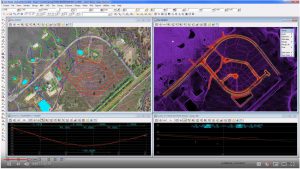New Webinar Series – Stormwater Drainage Design Fundamentals: Episode 1 – Project Preparation
Announcing…a new series of Training Webinars, to be run over the course of 2019, by Owen Thornton of 12d Queensland!
Owen has been writing software for 12d Solutions since 2003. He has a degree in Mechanical Engineering, a background in Computational Fluid Dynamics and 15 years professional experience in the civil and mining industries. He is the original author of the 12d Drainage Network Editor and the Drainage Analysis module, and a 12d specialist in drainage, utilities, plot parameter files, survey conformance, volumetrics, and system setup. Owen has recent consulting experience using 12d Model on a variety of large projects, to design: stormwater networks, industrial sites, landfills, dams, basins, channels, levees, access roads, rail sidings, car parks, building pads and retaining walls. These days, Owen also gives regular 12d training courses in drainage design and macro writing.
This new series of webinars – Stormwater Drainage Design Fundamentals – covers the basic and intermediate aspects of the Three Waters modules in 12d Model 14, with special emphasis on the design of stormwater drainage. It is presented as a condensed overview of the material normally covered in the first two days of the formal Three Waters training courses (W01 to W06) offered regularly by 12d Solutions. This material is assumed knowledge for many of the more advanced training courses available in the Three Waters suite.

A construction-ready drainage model – including catchments, pits, pipes, culverts, channels and flood extents – is created from scratch in 3D and designed for specified minor and major storm events using the Rational Method. Output plans, long-sections and calculation tables are also produced.
Episode 1 of the series – Project Preparation – was run on Wednesday 27th February 2019 – watch the video here. It details some of the preliminary steps required, before the drainage design can begin in earnest. Not all of these steps are mandatory, but they can certainly help to make the job easier.